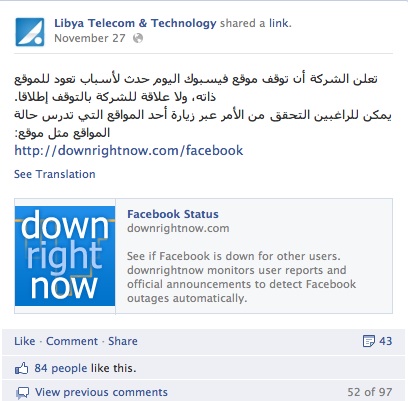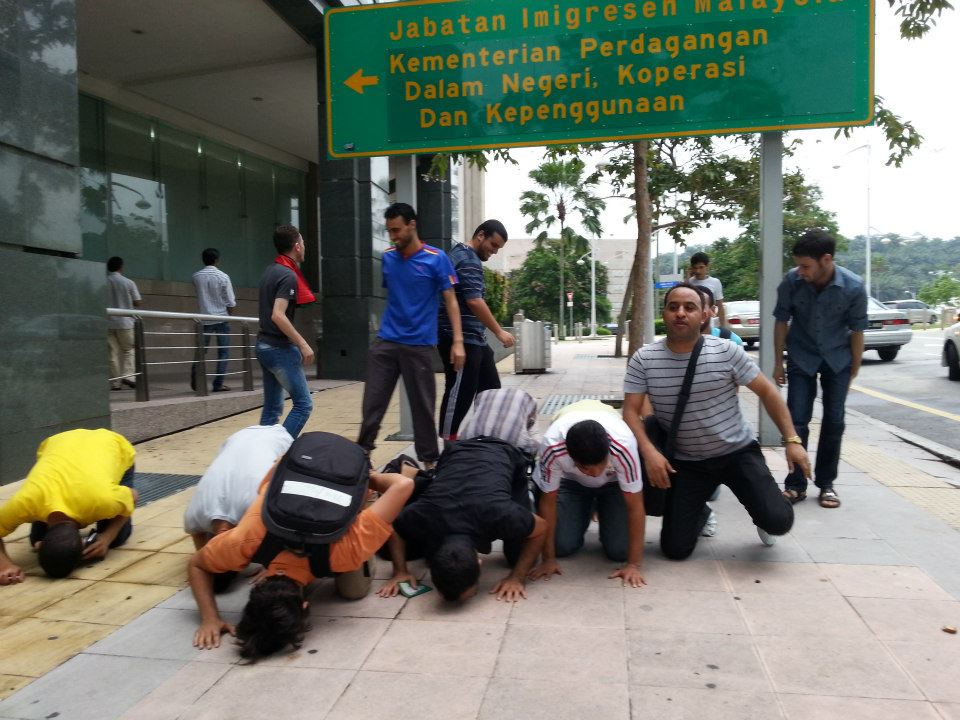By Nihal Zaroug.

Tripoli, 2 December:
When Facebook stopped working in large parts of Libya on Wednesday evening, rumours quickly abounded that the . . .[restrict]state internet service provider had intentionally shut down what is arguably the most popular medium through which Libyans offer their criticisms of the new authorities.
Continued disruption through much of Thursday only fed the fires, with many Libyans quickly turning to Twitter to vent their frustration at what many perceived as an Orwellian attempt to control free speech in post-Qaddafi Libya.
To diffuse accusations that Libya Telecoms & Technnology had blocked the site, the company posted on their Facebook page that the social network site had stopped working “owing to the same site, nothing to do with the company to stop it at all”.
Their post, which appeared on Thursday, suggested to use downrightnow.com, an online Facebook status checker, to verify that the site was indeed inaccessible.

The holding company for LTT, the Libyan Company for Post, Telecommunications and Information Technology, separately announced that there was no interference from LTT to block Facebook and that the problem occurred due to a technical issue from outside Libya, which also disrupted connectivity in other countries within the region.
This was endorsed by Ali Tweel, a member of the Libya Electronic Front, an online community that believes in universal internet accessibility and technological literacy. Tweel offered practical explanations into why Facebook was not working, and “reluctantly apologised” to LTT for initially blaming it for blocking Facebook. Tweel, also encouraged others to share his findings to quell criticism of the internet provider.
The inaccessibility of the site could not have come at a worst time, as Congress recently voted for the creation of a Ministry of Information to regulate Libyan media. The decision has been shrouded with controversy, with those against the move fearing government interference in freedom of the press and individual expression. Those in favour argue that the current unregulated situation in Libya is as dangerous as it is chaotic.
Misuse of networking sites is problematic, upon being elected as Prime Minister, a fake twitter account promptly appeared for Ali Zeidan. The account gained many followers and merited intervention by a spokesman for Zeidan. Facebook, like other social sites, is notorious for the proliferation of false reports. However, social sites are also sources of accurate news, as many government bodies, ministries and politicians use both Twitter and Facebook to engage with the public.
Like other Arab Spring countries, social media played a vital role in keeping the world informed on what was happening in Libya, despite near complete control of the internet by the former regime, activists in the country were still able to get news out. Facebook’s two-day absence was a reminder of what was endured during the war.
The use of social networking sites, especially Facebook, has been on a continuous rise since the revolution. According to statistics from Socialbakers, a digital media analysis company, globally Libya ranks as 90th biggest user of Facebook, though it is only the 109th largest country in terms of population. In August, Libya was ranked as 95th in the world, with 595,260 users, and by November the figure had reached 738,720 users.
In lieu of operating websites, many local businesses use Facebook to promote their products. For young entrepreneurs and new businesses owners, especially in the retail sector, Facebook is an ideal way to advertise and gauge demand for new merchandise. Similarly, culinary ventures have used Facebook to promote gran openings like Iceland Libya and Pappa Roti Libya.
In Libya, when one speaks of the internet, they generally mean Facebook, consequently creating a “fan page” is the best way to get noticed.
[/restrict]










